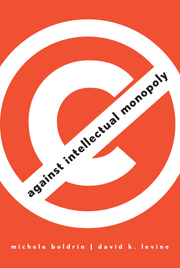Book contents
- Frontmatter
- Contents
- Acknowledgments
- 1 Introduction
- 2 Creation under Competition
- 3 Innovation under Competition
- 4 The Evil of Intellectual Monopoly
- 5 The Devil in Disney
- 6 How Competition Works
- 7 Defenses of Intellectual Monopoly
- 8 Does Intellectual Monopoly Increase Innovation?
- 9 The Pharmaceutical Industry
- 10 The Bad, the Good, and the Ugly
- References
- Index
- Plate Section
2 - Creation under Competition
Published online by Cambridge University Press: 30 July 2009
- Frontmatter
- Contents
- Acknowledgments
- 1 Introduction
- 2 Creation under Competition
- 3 Innovation under Competition
- 4 The Evil of Intellectual Monopoly
- 5 The Devil in Disney
- 6 How Competition Works
- 7 Defenses of Intellectual Monopoly
- 8 Does Intellectual Monopoly Increase Innovation?
- 9 The Pharmaceutical Industry
- 10 The Bad, the Good, and the Ugly
- References
- Index
- Plate Section
Summary
The basic conclusion of this book is that intellectual monopoly – patents, copyrights, and restrictive licensing agreements – are unnecessary. Always beware of theorists bearing radical ideas – most ideas are bad, and most theories are wrong. This book may be yet another entry in that long list of confused and confusing dreams.
Therefore, we must first and foremost convince you that our ideas are firmly grounded in facts and practice. Most innovations have taken place without the benefit of intellectual monopoly. Indeed, the system of intellectual monopoly as it exists today is of recent vintage – some parts of the current system are only a few years old, and their damaging effects are already visible and dramatic.
No gardens of utopia, then, but the fertile fields of practical experience, as illustrated by thriving markets without intellectual monopoly – that is what this and the next chapter are about.
Software
In spite of being all around us, facts are often invisible because we look at them with wrong-shaded glasses. Look closely at the computer on your desk. You see a mouse, a keyboard, and, on your screen, a bunch of different overlapping windows with word processors, spreadsheets, instant messengers, and a Web browser through which you can access a vast array of information on a great diversity of subjects. At the end of the Second World War – sixty years ago – digital computers did not exist, nor, of course, did the software that makes them work.
- Type
- Chapter
- Information
- Against Intellectual Monopoly , pp. 15 - 41Publisher: Cambridge University PressPrint publication year: 2008



